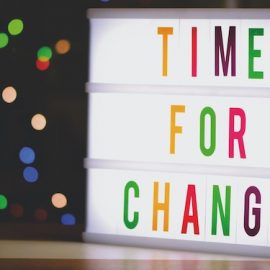

This article is an excerpt from the Shortform book guide to "Chop Wood Carry Water" by Joshua Medcalf. Shortform has the world's best summaries and analyses of books you should be reading.
Like this article? Sign up for a free trial here.
What makes the difference between achieving your goals and falling short? How can you stay motivated when progress feels slow or uncertain?
The lesson of Joshua Medcalf’s Chop Wood Carry Water is that the path to success isn’t just about reaching the finish line—it’s about embracing every step along the way. When you focus on the process instead of fixating on results, you’ll maintain momentum and find joy in your daily efforts.
Read on to explore three practical methods that will transform how you approach your goals and help you create lasting success.
Focus on the Process
Medcalf recommends that you focus on the process of achieving your goals rather than fixate solely on the results. This approach helps you maintain motivation, develop essential skills, and find fulfillment in your daily efforts.
(Shortform note: James Clear (Atomic Habits) clarifies how focusing on the process maintains motivation. He distinguishes among three types of habits: 1) Goal-driven habits, which focus on achieving specific outcomes (like acing a test); 2) system-driven habits, which focus on routines (like studying regularly); and 3) identity-driven habits, which are rooted in self-perception (like being a good student). Clear notes that goal-driven habits are limited in scope—for example, once you ace the test, you lose motivation to continue studying. System-driven habits, on the other hand, put processes in place that indefinitely produce the outcomes you want; this helps you consistently do your work, regardless of your motivation level.)
Let’s explore the three methods Medcalf offers for embracing the journey toward your goals: committing to daily practice, being patient, and viewing challenges as opportunities.
Method 1) Commit to Daily Practice
First, Medcalf says you should perform seemingly small and mundane goal-related tasks with consistency and care. Medcalf explains that adopting a daily, process-oriented approach will, over time, help you develop the skills, habits, and traits required to achieve your goals. Additionally, it will deepen your engagement with your work, allowing you to find meaning and satisfaction in routine tasks.
For example, if you’re a software developer, instead of fixating on creating a billion-dollar app, commit to honing your coding skills and contributing to open-source projects. Though these fundamentals are less glamorous, immersing yourself in them will build your expertise, create opportunities, and help you cultivate a genuine passion for your craft.
(Shortform note: Kotler (The Art of Impossible) clarifies how adopting a daily, process-oriented approach amplifies your abilities and makes routine tasks feel more satisfying. He explains that each time you complete a task, you trigger a dopamine spike that increases your motivation and concentration. This neurochemical reward makes you want to tackle increasingly challenging tasks. Thus, consistent daily practice creates a positive feedback loop that makes it both easy and pleasurable to gain momentum toward achieving your goal.)
Method 2) Be Patient
Next, understand that meaningful progress requires consistent effort and patience. Medcalf explains that improvement often takes the shape of plateaus followed by sudden breakthroughs. Recognizing this pattern helps you stay motivated during periods of apparent stagnation and encourages a more strategic approach to your goals.
For example, say you’re learning a new language. Instead of expecting overnight fluency, know that daily practice and cultural immersion will eventually allow you to hold a full conversation. With this awareness, you’ll find it easier to appreciate small wins, like understanding a new phrase, even when your speaking skills seem to plateau.
| Plateaus: Causes and Solutions Experts agree that plateaus are a natural part of learning. They suggest that plateaus result from eight different problems, each with its own solution. 1. You become desensitized to things that once worked well. Combat this by introducing different approaches and methods to shake up your routines. 2. You choose immediate benefits over long-term ones. Overcome this by extending your planning horizon and focusing on bigger future gains. 3. You work hard at ineffective moments and waste effort. Instead, learn to use strategic periods of rest as part of the process. 4. Your resources fail in multiple ways—through depletion, costly jumps in needs, bottlenecks, or unforeseen obstacles. Address these by finding ways to replenish resources, sharing costs with partners, working around limitations, and recognizing that you can’t account for everything perfectly. 5. You make decisions based on flawed information. Instead, take time to seek the objective truth that lies beneath your assumptions about how things work. 6. You lose effectiveness by trying to multitask. To overcome this, actively engage with one task at a time and adapt to shifts in priorities. 7. You don’t see gradual decline until it’s too late. Rather than wait for failure, set clear benchmarks that help you assess your progress and identify problems before they become serious. 8. You get stuck trying to achieve perfection. To keep moving forward, focus on taking first steps toward your goals, and learn to accept “good enough” results. This list suggests that to manage the obstacles holding you back and make meaningful progress, you need not only consistent effort and patience but also proactive adaptability. |
Method 3) View Challenges as Opportunities
Finally, reframe obstacles and setbacks as chances to learn and improve. Even with a positive attitude, you’ll inevitably face challenges as you work toward your goals. During these times, Medcalf recommends looking for ways to grow from the experience. This will shift your focus from frustration to problem-solving, allowing you to adapt and make the best of the situation.
For example, if you’re a researcher facing a failed experiment, rather than seeing it as a waste of time or a reflection of your abilities, analyze what went wrong and use your insights to refine your methodology and improve the overall quality of your research.
(Shortform note: Tony Robbins (Awaken the Giant Within) suggests a practical way to reframe setbacks as opportunities to learn and improve: Ask yourself empowering questions. For example, if you’re facing a failed experiment, ask yourself, “What can I learn from this result?” or “How can I use this experience to improve my research methods?” Empowering questions encourage your mind to effortlessly come up with proactive and positive solutions that help you make progress.)
Exercise: Embrace the Process of Growth
Medcalf emphasizes that authentic success comes from embracing the process of growth rather than fixating on end results. In this exercise, we’ll explore how you can apply his strategies to feel more fulfilled as you work toward achieving your goals.
- Reflect on one of Medcalf’s methods for cultivating a positive attitude (manage your thoughts, recognize your worth, define your priorities, or build a supportive network). How might applying this method change your approach to one of your current goals?
- Pick a goal you’re currently working toward and consider how you might commit to a daily practice that supports it. Be specific about what small, consistent actions you can take.
- Recall a recent setback or challenge you faced while pursuing this goal. How might you reframe this situation as an opportunity for growth?
- Based on Medcalf’s strategies, what’s one concrete change you plan to make in how you approach your goals or daily life? How do you think this change will impact your journey toward success and fulfillment?

———End of Preview———
Like what you just read? Read the rest of the world's best book summary and analysis of Joshua Medcalf's "Chop Wood Carry Water" at Shortform.
Here's what you'll find in our full Chop Wood Carry Water summary:
- The impact of a positive mindset on your goals
- How to stay focused on the process, not the result
- Why success is more than just the finish line






